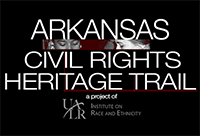2014 Civil Rights Heritage Trail honorees are announced
For the fourth year, the University of Arkansas at Little Rock Institute on Race and Ethnicity will honor individuals who have been integral to civil rights in the state by honoring them with bronze commemorative plaques on the Arkansas Civil Rights Heritage Trail in the heart of downtown Little Rock.
 A public ceremony and private reception to honor these exceptional men and women will be held in Little Rock on Friday, Oct. 24.
A public ceremony and private reception to honor these exceptional men and women will be held in Little Rock on Friday, Oct. 24.
This year’s honorees represent individuals from the medical and health care professions who have made significant contributions toward social and racial equity in Arkansas. Five of the honorees are living legends:
Dr. Thomas A. Bruce
Dr. Bruce has spent most of his professional career promoting access and quality healthcare to underserved populations. He has served as a professor of medicine and as dean of the College of Medicine at the University of Arkansas for Medical Sciences. He helped create and lead the Faye W. Boozman College of Public Health at UAMS and served as dean pro tem and associate dean of Clinton School of Public Service.
Dr. M. Joycelyn Elders
Dr. Elders was the first person in Arkansas to become board certified in pediatric endocrinology. She was appointed by President William Clinton to serve as the 16th Surgeon General of the United States. She was the first African American and only the second woman to head the U.S. Public Health Service.
Dr. Henry Foster Jr.
Dr. Foster was the only black person in his 1958 class of 90 students at the University of Arkansas Medical School. He was nominated by President William Clinton to become the U.S. Surgeon General in 1995. Foster served as dean of Meharry Medical College in Nashville, Tennessee, where he is a professor emeritus at the college.
Dr. Edith Irby Jones
Dr. Jones became the first African American to be admitted to the College of Medicine at the University of Arkansas in 1948 and the first to graduate from the college in 1952. After practicing several years in Hot Springs, Jones and her family moved to Houston, Texas. In 1985, she became the first woman to lead the National Medical Association, an organization of black physicians.
Dr. Billy Ray Thomas
The 11th of 12 children of parents who were sharecroppers, Dr. Thomas of Tyronza, Arkansas, was the first to go to college in his family. He is a highly accomplished neonatologist and currently serves as the inaugural vice chancellor for diversity at UAMS. Thomas has a special commitment to increasing underrepresented groups in the medical profession.
Posthumous honorees include:
Dr. Cleon Flowers
Dr. Flowers, known as the “Godfather of Arkansas Medicine,” grew up in Stamps, Arkansas, and graduated from Arkansas AM&N (now University of Arkansas at Pine Bluff) and Meharry Medical College. After serving in the U.S. Army Air Corps as a major, he returned to Pine Bluff to practice medicine and often accepted livestock or homegrown vegetables as payment for services from many poor black residents.
Lena Lowe Jordan, RN
Jordan came to Little Rock by way of Georgia and began her nursing career in Pulaski County in the 1920s. She became the head nurse at Mosaic Templars State Hospital in 1927. In the 1930s she founded the Lena Jordan Hospital which provided general care to black people in Little Rock who were not served by all-white medical institutions and facilities.
Dr. Samuel Lee Kountz
Dr. Kountz became one of the first black students admitted to the University of Arkansas Medical School in 1954. He was rejected when he first applied but was admitted after earning a chemistry degree from the University of Arkansas. He is best known for having performed the world’s first kidney transplant and more than 500 such surgeries.
Phillip Leon Rayford, Ph.D.
Dr. Rayford was a former chairman of the Department of Physiology and Biophysics in the College of Medicine at UAMS, as well as former associate dean of minority affairs. In his capacity, he worked tirelessly to successfully recruit and retain minority students in the College of Medicine and Graduate School.
Dr. John Marshall Robinson
Dr. Robinson opened a medical practice in 1914 at Seventh and Main streets in Little Rock, where he conducted surgeries in his office for African Americans since there were no hospitals that would serve them in the city. In 1918, Robinson and three other black physicians founded Bush Memorial Hospital. He was also a founding member of the Little Rock branch of the NAACP.
About the Civil Rights Heritage Trail
The Arkansas Civil Rights Heritage Trail was created in 2011 to acknowledge the sacrifices and achievements made by those who have fought for racial justice in the state. The Heritage Trail begins at the Old State House and currently stretches to the front of the Little Rock Regional Chamber of Commerce. As commemorative bronze markers are added each year, it will continue toward the William J. Clinton Presidential Center and beyond. Learn more about the Heritage Trail and past honorees at arkansascivilrightsheritage.org.
The UALR Institute on Race and Ethnicity was founded in July 2011. With a vision to make Arkansas the best state in the country for promoting and celebrating racial and ethnic diversity, the Institute conducts research, promotes scholarship and provides programs that address racial inequities. It does so by facilitating open and honest dialogue aimed at empowering communities and informing public policy to achieve more equitable outcomes.
Keep up with what’s happening; Subscribe to UALR Now.